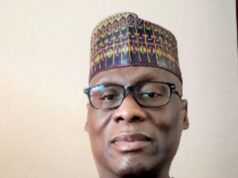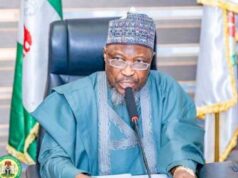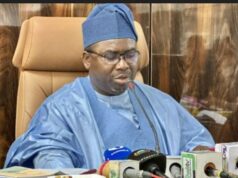
Chairman Revenue Mobilisation Allocation and Fiscal Commission (RMAFC), Mohammed Bello Shehu has lamented that the high cost of governance in Nigeria is draining the nation’s resources, asking the Federal Government to check it before it is too late.
According to him, the high cost of governance is also hindering economic development.
The RMAFC chairman, in a statement in Abuja today, March 10, identified the havoc caused by the high cost of governance through expensive presidential system, a bloated bureaucracy with overlapping ministries, and widespread corruption.
Shehu said that the excessive spending on administration far outpaced investments in crucial areas like infrastructure and industrial expansion.
According to him, the imbalance hurts the real sectors of the economy, ultimately impacting the lives of everyday Nigerians.
Shehu highlighted several other contributors to the high cost of governance to include inefficient public service delivery due to poor infrastructure; high security costs arising from insurgencies, kidnappings and other security threats; excessive payouts in salaries, severance packages and allowances; Extravagant spending by government officials; crippling burden of domestic and foreign debt and weak institutions that struggle to enforce regulations.
The RMAFC boss however, commended President Tinubu’s administration for embracing the Oronsanye Report as a blueprint for streamlining government agencies.
He said that the full implementation of the report could significantly reduce administrative costs, freeing up funds for vital infrastructure projects that benefit Nigerians directly.
Shehu also applauded the government’s current economic and monetary reforms and praised the focus on maintaining stable prices and exchange rates.
He said that these policies would help to curb inflation’s damaging effects.
Shehu said that price stability would allow Nigerians to plan their finances more effectively and protect the purchasing power of the Naira.
He said that a stable exchange rate would foster investor confidence and minimises uncertainties in the foreign exchange market.
“This, in turn, attracts foreign investment, improves financial inclusion, and creates a more predictable environment for businesses.”
The RMAFC boss also commended the ongoing reforms in the Bureau De Change (BDC) market.
“These reforms aim to establish transparent operations in line with international best practices.
“This will increase trust among businesses, regulators, and the public. A well-organized BDC market with clear procedures plays a crucial role in maintaining a credible foreign exchange system.”
He called on the Federal Government and states to use the increased allocations from the Federation Accounts Allocation Committee (FAAC) wisely.
“These additional funds should be used to provide adequate support to the Nigerian people, particularly those struggling with the effects of subsidy removal.”






